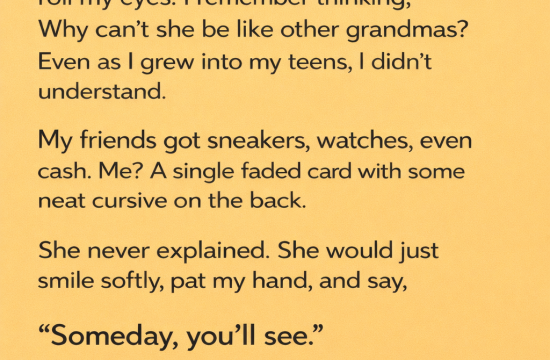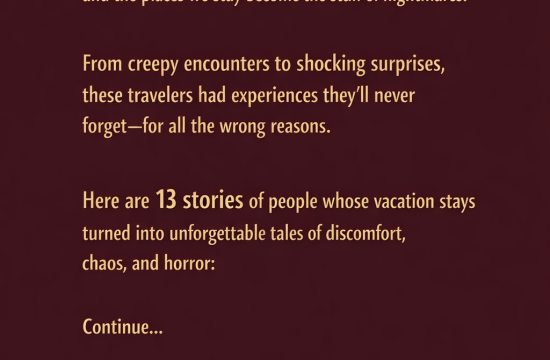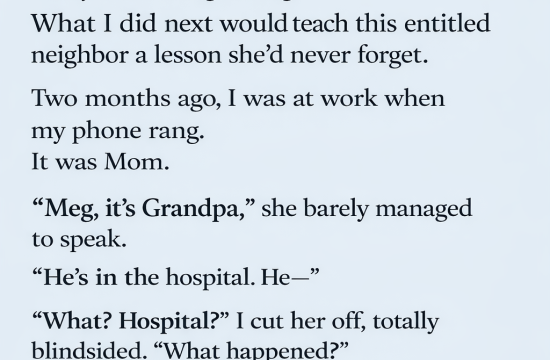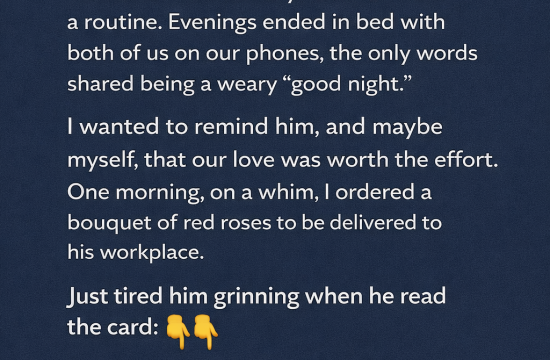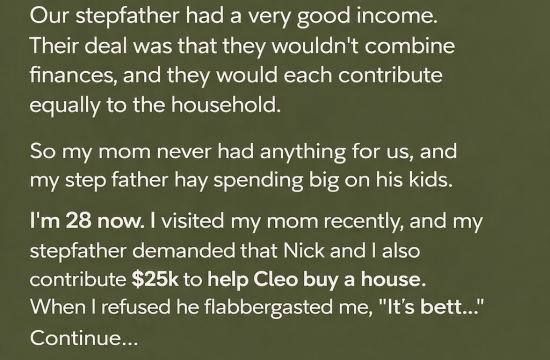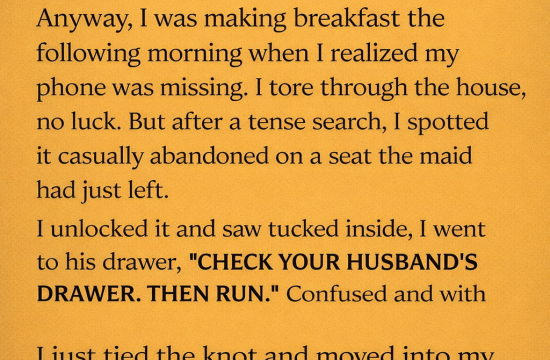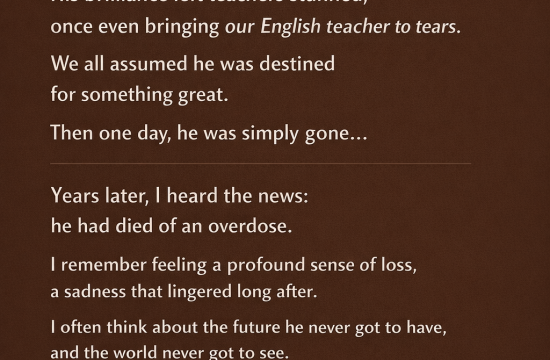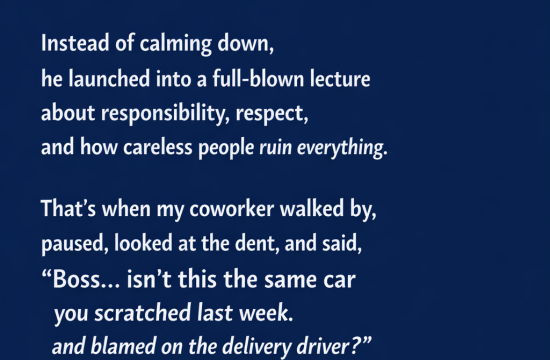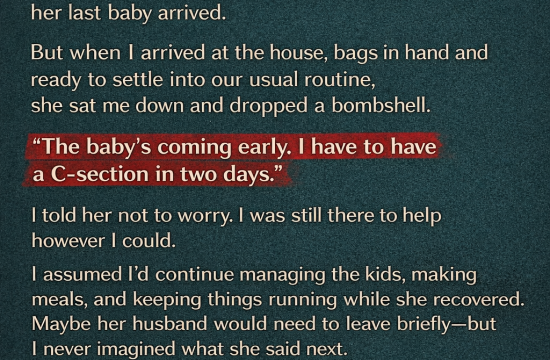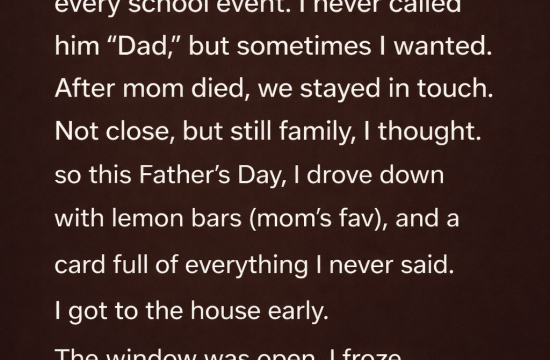My mom cried the first time she asked for money.
It was a Wednesday. I remember because I was making pasta and the water started boiling over just as I picked up her call. Her voice was thin, fraying at the edges. She said Dad had been diagnosed with a heart condition—something serious—and insurance wasn’t covering everything. Meds. Tests. Outpatient bills.
“Sweetie,” she whispered. “We’re drowning, Rachel. We’re not asking for much. But if you could help, we’d be forever grateful.”
I’d always wanted to give back. Gloria and Glen—my parents—raised me with more love than anything else. My dad worked two jobs. My mom turned scraps into comfort.
They celebrated my college scholarship like I’d been crowned. And when I landed a steady job in marketing, I swore I’d make life easier for them.
They deserved rest.
So I said yes.
For seven months, I wired over 85% of my salary to them. I kept just enough for rent and groceries. The rest? Theirs. It wasn’t even a decision. It was instinct. Like breathing. Like love.
Every time I transferred the money, I imagined it softening something. A pill bought. A bill paid. A brief moment of peace in a house full of worry. I pictured Dad sleeping easier. Mom drinking her tea with steady hands.
It made the long hours feel worth it.
They always told me not to visit. Dad was too tired, the house too messy, life too chaotic…
“Next month, Rachel,” they’d say. “When things settle down, darling.”
But the next month never came.
We FaceTimed sometimes. Always brief. Always close-up. I’d catch half of Mom’s face, or just Dad’s voice off-screen.
“He’s resting, honey,” she’d say. “I’m about to head to the kitchen to make him some soup and fresh croutons.”
I believed her. I didn’t pry. I didn’t push.
I just missed them. In that quiet, aching way you learn to carry without complaint—because asking for more feels selfish. But more than anything, I trusted them.
When my brain gets too loud, when the world spins too fast, I fall back into something strange. Something simple.
A question from the mental deck I’ve carried since I was a kid. Like a reflex.
Trivial Pursuit: What’s the only edible food that never spoils?
Answer: Honey.
That’s what their love had always felt like to me. Sweet. Sticky. Eternal. A constant. Even when I missed a birthday call. Even when I trembled hitting “send” on another bank transfer.
I imagined Dad, weakened but content, watching the news under a blanket. Mom in the kitchen, flour on her cheek. I imagined love surviving.
Every time they said, “We’re okay, thanks to you,” it quieted something inside me. Like I was finally repaying a debt I’d been carrying my whole life.
They always said not to visit. So I didn’t. I waited. For seven months. Until the conference.
It was a forgettable two-day summit two towns over. Hotel coffee. PowerPoint slides. Corporate bonding that left you more drained than inspired. But on the drive home, fate twisted the road past their neighborhood.
Saturday morning. Clear skies. The kind of day that feels like a clean page.
I stopped for pastries, grabbing two lattes, one with extra cinnamon—Mom’s favorite. And a green tea for Dad. I pictured her in the kitchen. I imagined Dad at the window, smiling already.
But then the front door opened.
And what I found wasn’t sacred. It was shattering.
She was sprawled across their couch like she owned it. Legs tucked under her, designer sneakers up on Mom’s antique coffee table.
A diamond-studded phone case glittered in her hand. She looked up slowly, lips curling into a smirk, like she’d been expecting me.
She sipped from a mug I didn’t recognize and said:
“Ah. You must be the replacement.”
My mind jammed somewhere between confusion and rising dread.
“I’m sorry… what?”
Then came the soft creak of floorboards behind me. And his voice.
“Rachel…”
I turned.
Dad stood there. Frozen mid-step. His eyes flicked from me to the woman on the couch and back again.
“You… you weren’t supposed to be here,” he whispered.
His face had gone pale. Like he’d seen a ghost. Or maybe just become one.
Her name was Melissa. My parents’ first daughter.
Born when they were barely out of high school. Kids trying to raise a kid. They couldn’t afford to keep her. Couldn’t imagine a future where they weren’t drowning already.
So they gave her up. Then buried her memory. Deep.
I never knew she existed. Not a whisper. Not a photo. Not a pause in a story. Nothing. I thought I was their only child. Their everything.
Then she came back.
Melissa found them last year. Talked about closure, reconnection, healing.
What she really wanted was revenge.
She told them her adoptive parents were strict. Traditional. Cold. Not cruel—just rigid. She didn’t care about what they gave. She cared about what she never got.
So she turned her bitterness into a plan.
She inserted herself into their lives—and eventually, into their home. She demanded what she felt she’d been denied: money, attention, devotion. She wanted everything I had.
And when they couldn’t give it to her?
She pointed to me.
“Golden child, Rachel,” she said. “She’s got a job. She owes you everything. Start collecting.”
So they did. With no warning. No explanation.
They spun a lie about Dad’s heart. Wrapped it in guilt. Sold it with tears and tightly cropped video calls.
And I bought it.
Hook. Line. Heartbreak.
Every dollar meant for healing went straight to Melissa. My sister. A stranger. Who looked me in the eye and called me a replacement.
And in that moment, I wasn’t sure if I’d ever been real to them at all.
Trivial Pursuit: What’s the capital of Liechtenstein?
Answer: Vaduz.
I stood in their living room, holding coffee and croissants, and felt my entire childhood rot at the edges.
Mom appeared from the hallway. Her face crumpled when she saw me. Dad looked deflated. Melissa? Still smug. Arms crossed like this was her stage.
“We didn’t know what to do,” Dad said. “She threatened to ruin everything. Said she’d tell you we never wanted you. We panicked.”
“You thought lying was better?” I asked, my voice barely above a whisper.
Mom sobbed. “She said she’d take you away. We believed her…”
Melissa rolled her eyes.
“I’m still here, guys. Don’t be dramatic. You got the perfect life. You owe me more than you’ll ever know.”
I stepped toward her. My hands shook. But my voice didn’t.
“No. I don’t owe you a damn thing. I didn’t abandon you. I didn’t ask to be born after you. And I sure as hell didn’t sign up to fund your tantrums.”
She flinched. Just slightly. A crack in the armor.
I turned to my parents.
“I loved you both. But this?” I said. “This broke something in me.”
Then I left. Dropped the pastries. Drove until the road blurred. Screamed into my steering wheel on the side of the highway.
I ignored their calls. For weeks.
And yet, I missed them. Every text I didn’t answer. Every cinnamon pastry I didn’t buy. Hurt in ways I couldn’t name.
Then one day, they showed up. On my doorstep.
They looked… older. Wrecked.
Mom’s voice broke before she even spoke. “Melissa never wanted us, darling. She said it to our faces.”
Dad added, “We thought we could fix the past. We were wrong. And all we did was break the one person who never asked for anything.”
I stood there, arms folded across my chest like new armor. My heart ached in ways I didn’t know hearts could ache.
“You should’ve told me,” I said.
“We know,” Dad whispered.
“But you’re still our daughter,” Mom said, reaching for my hand. “You always were.”
Trivial Pursuit: What’s the rarest blood type?
Answer: AB Negative.
I’m rare. I love hard. I trust harder. And yes—I bleed. But I don’t break.
We’re rebuilding now. Not with money. Not with guilt. But with truth. Raw, imperfect, and real.
Melissa left a few weeks later. Back to her adoptive parents, who promised her the world.
“You’re not worth the trouble,” she told them.
Maybe they weren’t. To her.
But they were to me.
And if she ever comes back?
She won’t find the same Rachel.
She’ll find someone who knows exactly who she is.
Trivial Pursuit: What year did the Berlin Wall fall?
Answer: 1989.
Sometimes walls fall. Sometimes they need to.
And sometimes, what’s left behind is the start of something stronger.


